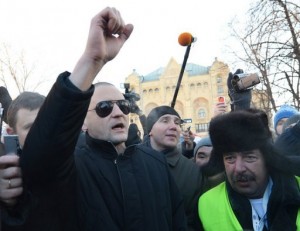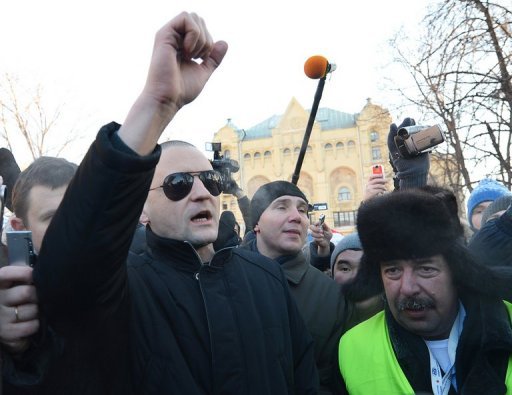
Moscow (AFP) – Russian police Saturday arrested several opposition leaders, including well-known blogger Alexei Navalny, as hundreds of people packed a central Moscow square in defiance of an official ban to protest Vladimir Putin’s rule.
Scores of Muscovites, many holding white roses, defied the authorities by turning up at Lubyanka Square, the seat of the FSB security services, despite temperatures of -14C and warnings that the unsanctioned rally would be broken up.
Navalny, possibly the most charismatic figure in the protest movement against the Russian president, was detained a day after investigators launched a new criminal probe against him for suspected fraud.
“It’s raving mad. [They] simply snatched me from the crowd,” Navalny tweeted from inside a police van.
Besides Navalny, police also arrested Sergei Udaltsov, the leader of leftist group the Left Front, and activists Ilya Yashin and Ksenia Sobchak, the daughter of Putin’s late mentor Anatoly Sobchak.
“Looks like I am a very dangerous criminal,” Sobchak quipped on Twitter.
The prominent figures arrested all noted on Twitter that the police vans holding them had been equipped with webcams to keep close watch on their behaviour.
Police put the turnout at around 500 people, half of them journalists and bloggers, but an AFP correspondent said the real number of the protesters appeared to be significantly higher.
People laid white lilies, carnations and chrysanthemums at the Solovetsky Stone, a monument to victims of Stalin-era purges adorning the square, as a helicopter hovered overhead.
One hour into the rally, the monument was blanketed by piles of flowers.
“Our authorities are repressive,” one protester, 48-year-old businessman Andrei Genin, told AFP, sporting a white ribbon, the symbol of the opposition movement against Putin.
City authorities had earlier banned an opposition march through the city, and the opposition Coordination Council had urged Russians to simply turn up at Lubyanka Square.
On the eve of the protest, Russian authorities launched a second major investigation against Navalny, accusing the protest leader and his brother Oleg of embezzling 55 million rubles ($1.8 million, €1.4 million) from a trading company.
Navalny, who has already been charged with embezzlement in an earlier case in which he faces up to 10 years in prison, vowed to press ahead with his political activism.
In a separate event, his supporters convened in the Russian capital to establish a new political party that would represent the interests of middle-class urbanities, the backbone of the anti-Putin protests.
Dubbed “The Popular Alliance”, the party will promote the “middle class and the European choice”, activist Leonid Volkov told Echo of Moscow radio, noting that Navalny himself would not be an official member.
The opposition movement is hoping to maintain momentum despite internal divisions between liberals, leftists and nationalists and the authorities’ tough crackdown on dissenters since Putin’s return to the Kremlin in May.
Even supporters admit that the euphoria that marked the first opposition protests that erupted after fraud-tainted parliamentary polls last December has largely died down.
Up to 120,000 people gathered near the Kremlin walls at the peak of the protests last winter, a huge number for a country that lost its taste for street politics after the turbulent 1990s.
The last major rally, in September, drew around 14,000 people, according to police, though the opposition argued many more had shown up.
Weeks after his inauguration, Putin signed off on a raft of laws that critics have attacked as a bid to quash dissent.
Scores of activists now face jail time for taking part in a 6 May protest on the eve of Putin’s inauguration and for alleged plans to overthrow the Russian strongman with the help of foreign sponsors.
Ahead of Saturday’s rally, Moscow prosecutors delivered a warning to leading activists, while police urged Russians to refrain from “provocations”.
Smaller rallies were held in several cities across Russia.
Sixty people held a 40-minute march in Tomsk in western Siberia despite temperatures of -35C, a representative of the Solidarnost (Solidarity) movement, Ksenia Fadeyeva, told AFP.
Fourteen people marched in the city of Krasnoyarsk in eastern Siberia, police said.



